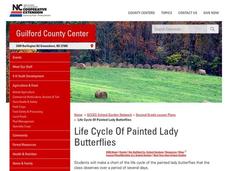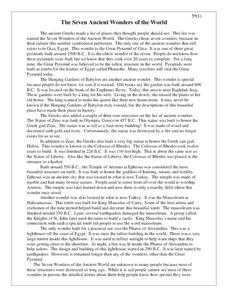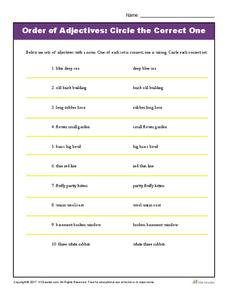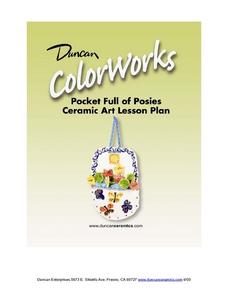EngageNY
Mid-Module Assessment Task: Grade 6 Math Module 4
Halfway through the module — the perfect time for an assessment. The 18th installment of a 36-part series is a mid-module assessment. Scholars provide evidence of understanding through various mathematical and contextual problems.
Pearson
Used To
Your class used to be confused about verb tenses, but now they understand more about the past tense! Practice the different ways to use used to in writing with a clear slideshow presentation, which includes negative and positive...
Curated OER
Subtracting Decimals #4
Practice subtracting decimals to the hundredths place. This assignment includes amounts of money and units of measurement. Three sections of problems provide subtraction problems in both vertical and horizontal formats, as well as two...
Curated OER
Language Arts: Ode to the Ordinary
Eighth graders select ordinary objects, determine their uses, and write poems about them. Once they select an object, they create a web about its uses to serve as an outline. Once they have written their own odes, 8th graders meet in...
Curated OER
Three Level Questions: Parrot in the Oven
Helpful for any reading comprehension lesson, this worksheet focuses on Victor Martinez's Parrot in the Oven. It contains three levels of questions: Right There (comprehension-level questions), Think and Search (questions you need...
Curated OER
Nutrients Nutrients We Need
Second graders examine the six nutrients humans need to maintain good heath. In this ecosystem instructional activity, 2nd graders learn about how plants grow and compare how humans need nutrients from plants to how plants need nutrients...
Gecko Mathematics
Gecko Mathematics: Multiplying Unit Fractions
Make learning visible! Have your mathematicians follow along as you use paper strips to demonstrate the concept of multiplying unit fractions. Then, offer a different way of solving the problem using a number line. Finally, introduce the...
National Museum of the American Indian
The A:Shiwi (Zuni) People: A Study in Environment, Adaptation, and Agricultural Practices
Discover the connection of native peoples to their natural world, including cultural and agricultural practices, by studying the Zuni people of the American Southwest. This lesson includes examining a poster's photographs, reading...
NC Cooperative Extension, Guilford County Center
Life Cycle Of Painted Lady Butterflies
The Very Hungry Caterpillar is the inspiration for this project-based learning activity. Kindergartners create a lifecycle chart for a butterfly with four sections: egg, caterpillar, pupa, and butterfly. It is a three-dimensional...
Illustrative Mathematics
To Multiply or not to multiply?
When do you multiply a fraction by a fraction? Here, fifth graders are given 10 different word problems and asked to decide if multiplying 2/5 x 1/8 is appropriate. Many times, real-world word problems sound similar although the required...
Curated OER
The Seven Ancient Wonders of the World
Did you know only one of the Seven Wonders of the World still exists today? Here is a historical reading passage that provides readers with a brief history of the seven marvelous wonders.
Cornell University
Study Soil
What's in soil? Young scientists study the pH levels of soil from their school yard. They observe the land and area the soil came from to decide if location has anything to do with acidity level.
Chymist
Landfills and Recycling
Examine the nature of landfills through experimentation. Scholars build miniature landfills and monitor changes over a six-week period. Observations allow individuals to draw conclusions about the different types of trash and their...
K12 Reader
Order of Adjectives: Circle the Correct One
Which comes first in an adjective phrase: a word denoting a noun's quality, or a word describing a noun's function? If your elementary grammarians don't know the answer, have them review ten pairs of adjective phrases and circle the one...
Curated OER
Pocket Full of Posies: Ceramics
After studying the plant or flower life cycle, have the class create a basket of flowers out of clay. They hone their ceramics skills while they push, pull, then paint clay to look like flowers they've seen in nature. There are several...
Curated OER
Observing the Pumpkin Cycle
Students observe and listen to nonfiction books about the life cycle of pumpkins. They practice early reading skills in a shared reading related to pumpkins. They observe the life cycle of a pumpkin including growth and decay.
Desert Discoveries
What's the Buzz on Native Bees?
Young biologists describe the different types of bees that are native to the Sonoran Desert. They look at the nesting and feeding requirements of the insects, and study how they are able to pollinate many plants found in the environment....
Curated OER
Social Studies: Getting to Know You
Students in kindergarten and college students engage in dialogue designed to help them get to know each other. They meet at three discussion centers, where the students express what makes them happy, how they are seen, and how they are...
Curated OER
Our Playground!
First graders observe and explore the playground's environment by walking around the playground, followed by a group discussion of what they observed. They then divide into groups and participate in centers, their brought back together...
Curated OER
Count by 100s
In this counting by hundreds to problem solve worksheet, students count and write by hundreds in sequence, add a hundred, and model using flats and rods to solve six problems.
Curated OER
Possessive Adjectives
You could use this resource with your young native English speakers or your English language learners. They practice using possessive adjectives like my, your, his, her, its, our, and their. First they study a chart that compares...
Curated OER
Describe common actions and objects in specific and general language
Having a diverse and well-developed vocabulary make for both good readers and good writers. The class discusses basic grammar, such as nouns, verb, and adjectives. They then view a series of pictures and work as a class to create simple...
Education Outside
Honey Tasting
Young scientists will be abuzz as they sample and compare the tasty treats produced by Apis Mellifera.
Soft Schools
Rewriting Similes and Metaphors
As part of a study of comparison, kids transform similes into metaphors and metaphors into similes.
Other popular searches
- Flower Gardening
- Ecological Gardening
- Vegetable Gardening
- Organic Gardening
- Pond Gardening
- 18th Century Gardening
- Outdoor Recreation Gardening
- Gardening Soil
- Gardening Curriculum
- Fruit and Vegetable Gardening
- Gardening Catalogs
- Special Education Gardening

























